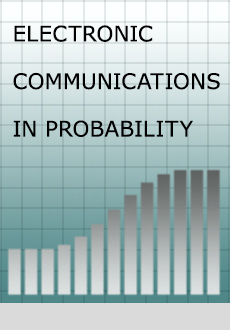Abstract
Let $f=(f_n)_{n\geq 0}$ be a nonnegative submartingale starting from $x$ and let $g=(g_n)_{n\geq 0}$ be a sequence starting from $y$ and satisfying $$|dg_n|\leq |df_n|,\quad |\mathbb{E}(dg_n|\mathcal{F}_{n-1})|\leq \mathbb{E}(df_n|\mathcal{F}_{n-1})$$ for $n\geq 1$. We determine the best universal constant $U(x,y)$ such that $$\mathbb{P}(\sup_ng_n\geq 0)\leq ||f||_1+U(x,y).$$ As an application, we deduce a sharp weak type $(1,1)$ inequality for the one-sided maximal function of $g$ and determine, for any $t\in[0,1]$ and $\beta\in \mathbb{R}$, the number $$L(x,y,t,\beta)=\inf\{||f||_1:\mathbb{P}(\sup_n g_n \ge\beta)\ge t\}$$ The estimates above yield analogous statements for stochastic integrals in which the integrator is a nonnegative submartingale. The results extend some earlier work of Burkholder and Choi in the martingale setting.
Citation
Adam Osekowski. "Sharp tail inequalities for nonnegative submartingales and their strong differential subordinates." Electron. Commun. Probab. 15 508 - 521, 2010. https://doi.org/10.1214/ECP.v15-1582
Information





